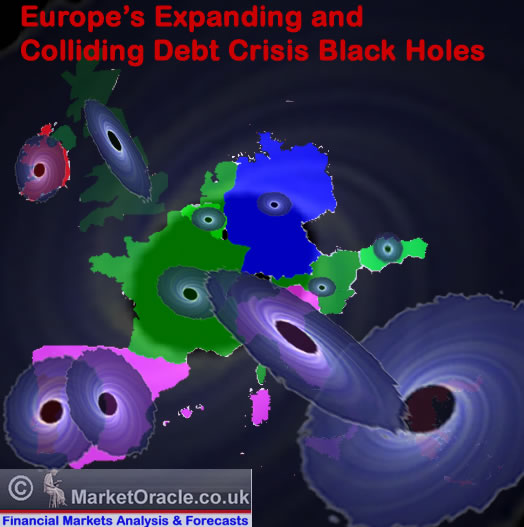Sovereign Debt Crisis Dominos Are Lining Up to Collapse
Interest-Rates / Global Debt Crisis May 02, 2010 - 07:32 AM GMTBy: Bryan_Rich
 Boy, what a week! I’ve been warning about a troubled euro and a building sovereign debt crisis for some time. And the bond and currency market activities this past week are a clear example that the momentum is picking up.
Boy, what a week! I’ve been warning about a troubled euro and a building sovereign debt crisis for some time. And the bond and currency market activities this past week are a clear example that the momentum is picking up.
There’s a bumpy road ahead … and not just for Greece.
For those of you who aren’t closely monitoring this drama in Europe, you should be. As I’ve explained in recent Money and Markets columns, the events in Greece will likely impact your investments and the economy, both in the U.S. and abroad.
And if you haven’t followed the events of the past five days, here’s a brief recap of what’s transpired, the impact on global financial markets, and what to expect from here on out …
First, the Greek government’s official request for a rescue package from its European partners and the IMF did not calm fears. Instead, the Greek bond market shifted into another gear of panic. Investors and speculators rushed out of Greek debt, driving up two-year borrowing costs for the Greek government to over 18 percent.
But that wasn’t all. The contagion factor started rearing its head.
The grim outlook for Greece sent investors and speculators looking at the next likely victim, Portugal. And Portugal’s debt was aggressively sold, sending yields jumping to more than three times the levels of early last month.
And downgrades soon followed. S&P downgraded Portugal’s credit rating two notches and downgraded Greece by three notches, to junk status.
There was more …
With the Portugal domino starting to wobble, the biggest, most threatening weak spot in the euro zone, Spain, came under the spotlight. As a result Spanish bonds were dumped, and S&P responded in kind, with a downgrade on Spain and warnings of possible further downgrades.
 |
| The stability of the whole euro zone is at stake. |
All of this sent the euro tumbling further, and sent shockwaves through global financial markets.
This is a scenario I’ve expected to unfold since Dubai failed to make good on their sovereign debt last year.
And these recent events in Europe are just a few more steps in what will likely be early innings of a full blown global sovereign debt crisis.
For those who have convinced themselves that a V-shaped economic recovery is underway, and that the problems in Europe will stay in Europe, they should be very careful.
Here’s why …
The Global Picture
This most recent recession shares two key features found in three other recessions in the past fifty years:
1. Global synchronization — According to the IMF, at the trough of the recent recession a whopping 65 percent of world economies were in a recession, too.
2. Financial crisis — In recessions associated with a financial crisis, the recoveries were slower because households are in saving mode, credit is tight and demand is weak.
And based on the IMF’s study of 122 recessions, for recessions that coincide with financial crisis recoveries tend to be slower. In fact, advanced economies should expect 5+ years of weak economic activity.
It all boils down then to knowing where the global economy stands after emerging from the most severe economic downturn since the Great Depression. For that answer, let’s look at:
The Four Stages of Collateral Damage of Past Financial Crises
Stage #1— Deficits …
When tax revenues decline and government stimulus spending rises, countries tend to swiftly turn budget surpluses into deficits. And for countries already running deficits, the deficits just get bigger.
Stage #2— Debt …
Facing weak growth and dwindling tax revenues, those deficits turn into debt. Soaring debt with questionable growth prospects ultimately flash warning signals to global investors.
Stage #3— Downgrades …
Those warning signals turn into credit downgrades.
Stage #4— Default …
 |
| “Markets tend not to discriminate as much when there’s panic.” —Ken Wattret, European economist, BNP Paribas, London |
And finally, credit downgrades tend to drive borrowing costs higher, which can force the fiscally fragile into default.
History also shows that sovereign debt defaults can be contagious.
Whether or not Greece receives funds from its European partners, the structural hurdles facing Greek put a default scenario squarely on the table.
Perhaps that’s why the head of the IMF planted the seed last week, noting his plans to discuss a debt restructuring with Greece as part of the Greek rescue agenda.
Nonetheless, the dominos for a sovereign debt crisis are clearly in line.
As fears over deficits and debt continue to spread, expect the problems in Europe to test the lifespan of the euro, and ultimately present challenges to global financial markets and global economic recovery as fears spread to the UK, Japan and the U.S.
Regards,
Bryan
This investment news is brought to you by Money and Markets. Money and Markets is a free daily investment newsletter from Martin D. Weiss and Weiss Research analysts offering the latest investing news and financial insights for the stock market, including tips and advice on investing in gold, energy and oil. Dr. Weiss is a leader in the fields of investing, interest rates, financial safety and economic forecasting. To view archives or subscribe, visit http://www.moneyandmarkets.com.
© 2005-2022 http://www.MarketOracle.co.uk - The Market Oracle is a FREE Daily Financial Markets Analysis & Forecasting online publication.



